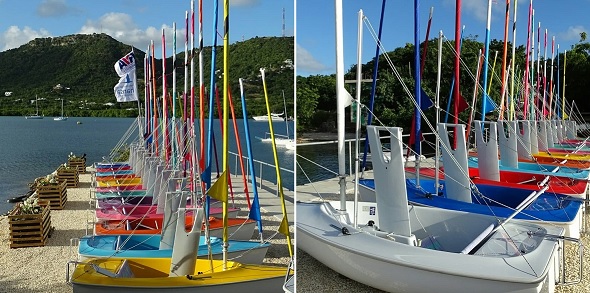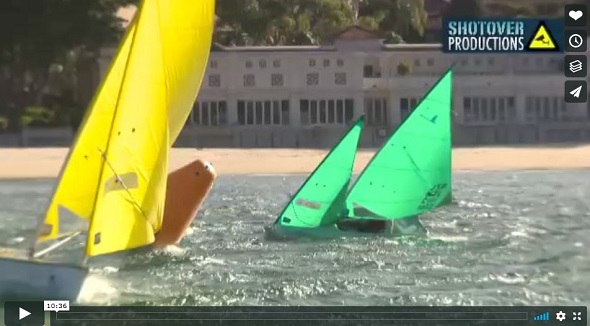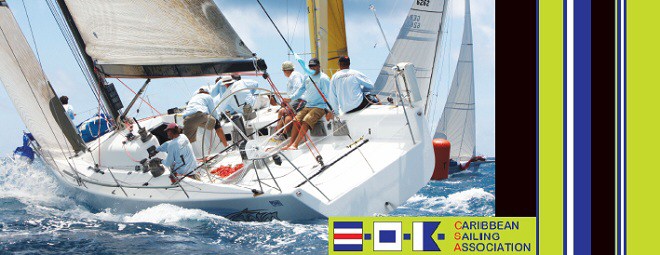CHANGE YOUR MINDSET IN SAILING Friday 25th January 2019
By Alison Sly-Adams, President of the Caribbean Sailing Association.

Hansa 303’s in use for the last two weeks at the National Sailing Academy as part of the PDP and for use in the School’s Programmes.
Its been a mind-blowing week in Antigua (if you're interested in exploring the narrative).
In case you haven’t seen it there has been a week long Para-sailor Development Programme taking place at the National Sailing Academy where sailors and sailing programme managers came in from Trinidad, Colombia, the Dominican Republic, Trinidad and Tobago and of course host nation Antigua along with the World Sailing Team who delivered the course from France, South Africa and the UK and the Hansa team from Australia and Holland (they also bought 20 Hansa 303’s with them to assist in course delivery).
On top of that the Caribbean Sailing Association piggy backed on all of the great knowledge that came together at the beginning of the week and had a one-day workshop to discuss sailing development in the region and were joined additionally by representatives from Grenada, St. Maarten and St. Croix.
And the single thread that ran through all of the hours of workshops, discussions and coach development is that inclusion is top of the list for all of us in terms of developing the sport. But what does that mean?
One thing that is interesting is that thought is converging. The Royal Yachting Association (RYA) wrote a piece in October called ‘Why Sailability is #morethansailing’ but again what does that really mean?
If you haven’t tried it, you may not know that sailing just like anything in life, while it may be a sport or leisure activity which at its basic level requires some basic skills, what it fires off in your brain is a whole host of other stuff. Depending on your own internal make up that will then result in a list of possible benefits both mentally and physically.
Richard Branson this week, in what feels like a very timely campaign, has launched #valuable which is a worldwide call to action for business to recognise the value and worth of the one billion disabled people globally.
At grassroots level in sailing however, inclusion is not just about recognizing and including differently abled people, but also all of the people who perceive sailing is not accessible to them whether it be low income people, adults who just never tried it, women who can get put off the sport for a whole host of reasons, or indeed a family pursuit.
At the National Sailing Academy last night, I was lucky enough to hear one man’s view on inclusion in the sport of sailing. Chris Mitchell is the Hansa designer and the secretary for Sailing for Everyone Foundation and for twenty years has promoted inclusion in the sport.
If you want to have your thought processes challenged, take a read of Chris’s presentation last night. Are we ready for this in the region? I believe we are…..what do you think?
It’s about Love
Sailing is seen by non-sailors as an elitist and expensive sport, but sailing actually has an opportunity to change that, if it wants, but it may not want to as much of its elite-ness comes from boats being beyond the reach of most people, and the structure of sailing is there to support its membership, who can afford to own boats. The Community Sailing model encourages diversity and dilutes elitism, but there is always strong emotional, often irrational attachment to different classes of boats which inhibits change, and there is always inertia, resistance to change with all big complex global organizations like World Sailing. Throw in natural conservatism of well-heeled contented people, reduced empathy for less fortunate people, and commercial interests protecting their turf, these are all factors which exacerbate inertia.
Well in the background is the innate human tendency to conform to the polarized nature of our world, the hills and valleys, girls/boys, night and day, Yin and Yang, everything has its opposite, so we have the Olympics and Paralympics, disabled versus able bodied people. But not everyone looks at things that way, and inclusion theory is an example of that.
It should not be surprising that sailing is under pressure in today’s frivolous world of instant unlimited choice. The Hansa bird has an interesting perspective on this, to a degree from the outside looking in, and we would like to make a contribution, but it’s very frustrating as Sailing doesn’t seem to understand what we are saying. Possibly because we are not here to sell boats, we are the Sailing for Everyone Foundation and use our boats and sailing to encourage social change.
Watch the video of the Hansa’s racing in the 2012 Hansa Worlds in 25 plus knots of breeze.

Hansa produce a range of little keelboats, they are of Universal Design, meaning everyone can use them. They are intuitive, you sail them seated facing forward, they are steered with a joystick instead of a tiller, they are instantly reefable, they don’t capsize, they are bright appealing colours, mums and their daughters love them, and because they are UD no one is excluded. They are designed around a different operating system, you sit low in the boat, it’s not about athleticism, but this “oddness”, which appeals to non-sailors for whom they are designed, doesn’t sit well with everyone in the conservative sailing world.
If Sailing used UD craft at an entry level it would attract millions of new people into the sport, and as that includes disabled people sailing would become the most inclusive sport in the world.
Look at the situation today. What about all the disabled people who go to work, and go to school. Do they want to spend recreation time with their friends and family, or join a segregated disabled sailing group? Today most Sailability programs around the world are operating as a disability service, a valid project, but it's for disability organizations, not the majority of disabled people who live, work and go to school in the mainstream.
Where do all the families with a member with a disability fit in? If sailing used little UD keelboats then they can sail together, and they would. Use UD sailboats in entry level school programs, then any child with a disability can simply join in as an equal, use them in weekend community sailing programs so the whole family can participate together. Still use them in Sailability programs because that is a service for disability institutions, but when you use them in mainstream programs you create an inclusive sport, probably the first fully inclusive sport on the planet.
With that sailing will grow instead of the steady decline we see today, we lead the way in inclusive sport and we can promote to the world and change our image. Is that too much to imagine? Obviously as we have been banging on about it for 20 years.
We aren’t talking about displacing optimists and lasers, we are talking about creating and endorsing a new level underneath the existing participation pyramid. For those who say ok but we don’t like the colours, and we want back to front tillers not joysticks, or we don’t want to teach kids how to sail in boats that won’t capsize, we say we didn’t design these boats for guys like you, we designed them for the 98% of the population who don’t yet sail because they see sailing as an elitist and expensive sport.
But on the technical side the first thing sailing could do is recognize an entry level sailing course applicable to mini keelboats. The options are now do a dinghy course, but we can’t pass you on that as you need to know capsize drill and use a tiller. So, use the keelboat course, but now we need flares and all the tangents applicable to keelboats.
We have a course called Sailing for Everyone Start, and another S4E Racing. How do we get an MNA to endorse these? Maybe here we have a great opportunity for the Caribbean Sailing Association to lead the world.
I started this talk from the perspective of Universal Design, usually it’s the other way around.
Universal Design and Inclusion are very much related, they are the two sides of the same coin, because If you want inclusion you obviously need to use equipment everyone can use, so the equipment needs to incorporate elements of Universal Design. You don’t have one without the other.
Whereas UD is about the hardware, Inclusion is the software. Inclusion is about Diversity, we are all different, we can accept that each individual is unique, so in a way there isn’t really a norm, instead its normal to be different.
Therefore, we should not talk about us able bods over here who are normal, and those disabled people over there who are abnormal. Maybe it's better to say we are all different, all shades of difference, while some have extreme difference. We can focus that to say simply inclusion accepts everyone as equals, regardless of their apparent difference.
Something else to consider is some people are born with a disability, some acquire it along the way, the rest of us will become terminally disabled sometime before we die. Disability is the one club we can all join in an instant. So, we should accept disability as a normal aspect of life, not an oddity.
To be inclusive activities need to use equipment and rules which level the playing field, which allows everyone the opportunity to be in control, to win or lose in their own right, according to their desire and ability. Inclusion is also about Independence.
Give someone their independence to pursue an activity which they enjoy and they will want to practice it in their own way, and as they improve their skills, through hard work and success they will grow in confidence which will be carried through to other aspects of their life.
Where this might lead, we are not to know, so if we can we should give everyone this chance. To deny it is to deprive someone of their independence. Here’s a quote from Dostoyevsky. “To go wrong in one’s own way is better than to go right in someone else’s”.
Sailing also opens other doors as there is something therapeutic in the motion of a sailboat through moving water, and by giving someone the tiller they are free to blend for themselves the sounds of wind and waves, and control that undulating motion.
So when left alone they are truly free, doing things on their own, often something denied them for years, and for some alone and in charge for the first time in their life.
Recreational sailing is one aspect, but competition too is important as learning to deal with competitive pressure, learning strategies to overcome uncontrollable situations, reacting to equipment and other players all require motor skill, determination and brainpower. Synchronising the mind and body to function together facilitates optimal growth and personal development.
There is also something magical about our little boats which comes from a harmony and elegance in their universal design credentials and the original vision as a perfect little boat to introduce novices, or any ability to sailing.
I'll finish by saying ramps and handrails, even UD sailboats are about access, inclusion builds on that and makes people from diverse backgrounds feel welcome. So inclusion is more about attitude, a change of heart, about love.
Click here for all News and Specials for Caribbean Sailing Association
| 


